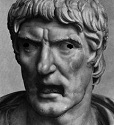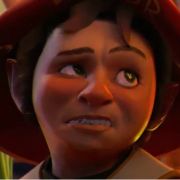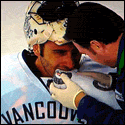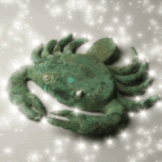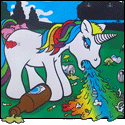|
ravenkult posted:I got plot problems. What happens if you decide to write the story from the daughter's perspective? Why is this crazy dad-bot trying to put her in a stasis pod for what might be forever?
|
|
|
|

|
| # ? May 15, 2024 02:19 |
|
Noah posted:What happens if you decide to write the story from the daughter's perspective? Why is this crazy dad-bot trying to put her in a stasis pod for what might be forever? I'm 4000 words in, I'd rather not rewrite the whole thing. Your idea sounds better, though.
|
|
|
|
It is hard to say what is a good direction to take because anything could happen. What do you want to happen? Maybe you should think about what the ending is going to be and then write towards that goal rather than writing to see what happens next.
|
|
|
|
I haven't had much luck thinking in terms of plot--whenever I write plot-heavy stories, it feels like I'm telling something artificial, where there's just filler in between the important scenes. So my advice is to write from character, and let your character's conflicts be the driving force of the story. Your cyborg--how long has he been there, all twelve years? That's a long time to be alone. How would that make him feel? How would that make him act? What's it like to be immune to the horrors of radiation, while a lot of the world isn't? What feelings drive him? So let's run the cycle here. Your cyborg, he hasn't seen anyone in twelve years. How does he act when he sees the girl? What does he think? Is he afraid? Curious? Obsessed? How much of his past life does he remember? How does he feel being part machine? Less than human? Ashamed? Shy? Whatever answers you come up with, they're your baseline. So say he's ashamed and shy. But curious. Maybe a little obsessed, a little possessive. So he watches her. He sees her digging through the ruins of the house. Sees her grab a picture (or a "holo-tape" or whatever), sees another man in that picture he doesn't recognize. So he's jealous. He feels like he's competing with a picture. Maybe the circuits in his brain are misfiring, maybe an emotion (jealously) that most of us can ignore, he can't. So he goes after the girl. Tries not to frighten her. She hates him at first because he's ugly, he's a machine, got like, guts hanging out in between circuitboards or something. But then he says something, (some symbolic objective correlative you can play with in the story), she starts to think he's her dad. How does she feel? Knowing that her father, who she loved, is this thing? Does she run? Does she get into trouble? Does he save her? What lengths does he go to? Those questions are what you want pushing your story forward, because those questions generate the conflict and the conflict is what should drive the plot. And don't feel bad about trashing 4000 words, because 4000 words isn't poo poo. I've trashed 150,000 word first drafts because they sucked or because I had to write them to work out a writing style I got obsessed with.* But tldr: character first, emotion first. Everything else comes from that. Plot is a shortcut to passive characters, and they're just no fun to read about. *This happened after the first time I read McCarthy. Wrote a whole goddamn fantasy novel with his verbose, elliptical style. Completely aped it. No one'll ever see that story, but that doesn't matter, because it helped me improve. (edit for clarity) Asbury fucked around with this message at 19:35 on Sep 11, 2013 |
|
|
|
If you're having problems with plotting, I recommend the book 20 Master Plots: And How to Build Them. At the very least, it will help you decide what kind of plot your story is, and it will help you write it. The examples are pretty good, too.
|
|
|
|
3Romeo posted:I haven't had much luck thinking in terms of plot--whenever I write plot-heavy stories, it feels like I'm telling something artificial, where there's just filler in between the important scenes. This is great advice for an unsteady writer who is mostly focused on getting something finished, but as general advice I strongly disagree with it. Some of the best novels of the 20th century have been plot driven. I don't think 1984 was conceived as a vehicle for exploring the characters of Winston and Julia, it was designed to explore a set of premises about the state and society, and the characters are used to explore this dynamic. This is especially true in Science Fiction. Think of Children of Men (the novel, not the movie). Its got a lot of characterization but its also based around exploring a premise - what would the world look like if we were the last generation and there was nothing coming afterwards? How would people cope? How would society be different? Plot driven fiction is harder to pull off because you actually need to have something interesting to say or some point that is worth exploring, so its certainly easier to gently caress it up. But that doesn't mean no one should try. In fact the origins of science fiction as a genre are entirely plot driven stories where the characters were explicitly supposed to just be ciphers for ideas. I wouldn't actually advocate anyone write that way today, since without compelling characters its unlikely anyone will read far enough to get through your plot, but I think the point stands. Not everything needs to be character driven. Extremely character driven science fiction gives you Stephen King, who is a great author in some ways but who is notorious for not knowing how to end most of his books. Also because he relies on the same character tropes once you've read a couple of King's books you start to notice these unmistakable patterns that can become rather grating. ravenkult posted:I got plot problems. Seems to me like the basic question here is why are you telling the story. If your focus is emotional (which it seems to be since everything you're mentioning here is based around a relationship) then I would say you should follow 3Romeo's advice (which I think is pretty good on the whole, despite some major caveats). On the other hand if you're trying to explore questions like how do people cope after a disaster, or how would a world with cyborgs be different from our world, or how the emotions of man and machine do or don't mix, or something like that, then this should be a consideration for how you're writing your piece. Basically, why is someone going to read what you write? There are plenty of different types of readers and you'll never please all of them (just look at the conflicting advice you're getting right now) but you need to have at least a general sense of what you think is compelling about your own story. Or if you're really unsure about what to do then I'd suggest that you just grit your teeth, push through to the ending you already have worked out, and then just write something you're more excited about. If you've already invested a bunch of time in what you've done then there's something to be said for making yourself complete it, even if you don't think you'll ever do anything more with it. Its dangerous to get too deeply into the habit of starting and then abandoning work, and its often better to force yourself into completing a bad story.
|
|
|
|
It seems strange to me to want to write a story without having an overarching point or message to the story. As the above poster said, why are you writing if you don't know what it is you're writing about? You can start with a concept, a scenario, and progress from there in your world-building -- but the whole thing needs to be built around ideas. You're transmitting a concept to your audience, you're trying to broadcast some profundity that will alter people's worldview, even if it only lasts as long as it takes to read your story. You're trying to take them someplace and make them see something different for a while, something they couldn't ever experience just by living their own life. Sometimes endings change, and that's fine. But you need to base your project around ideas, around concepts. A story, no matter how well it's told, that ends without significance -- that's a slap to the face of the reader. They need to know that what they just read has meaning. It's why so many people start at the end and work their way back. e: It's very "80's business guy", very "Hollywood", but it's worth treating your story ideas like an elevator pitch -- try to reduce the 'gist' of it to a 30-second segment. Try to make it enticing, and try to impose some sense of meaning to it. Summarise the meanings of your story and the lessons learned by either the audience or the characters within your story. You may find yourself re-writing a hell of a lot of stuff that is actually meaningless as far as literature is concerned. Words on a page don't make it a story. Sulla Faex fucked around with this message at 21:39 on Sep 13, 2013 |
|
|
|
|
Sulla-Marius 88 posted:It seems strange to me to want to write a story without having an overarching point or message to the story. As the above poster said, why are you writing if you don't know what it is you're writing about? Sometimes you have an idea but it doesn't work out and then you're stuck?
|
|
|
ravenkult posted:Sometimes you have an idea but it doesn't work out and then you're stuck? What's the idea then, what's the moral of the story -- take it to its natural conclusion.
|
|
|
|
|
Sulla-Marius 88 posted:What's the idea then, what's the moral of the story -- take it to its natural conclusion. You're not worried that is going to turn into preaching? Every story has a moral of some sort. If the writer wasn't planning on putting a theme into the book, some part of them will come out into the story. The reader will be able to infer a 'meaning' or higher theme to the book if it is well written enough. But to me, the idea of a story built around a theme will result in a version of Atlas Shrugged. Even if well written, it's going to preach to the converted and anger those who disagree with the moral. VVVV That is what I wanted to say, listen to this person instead. Lord Windy fucked around with this message at 01:42 on Sep 14, 2013 |
|
|
|
Lord Windy posted:You're not worried that is going to turn into preaching? Every story has a moral of some sort. If the writer wasn't planning on putting a theme into the book, some part of them will come out into the story. The reader will be able to infer a 'meaning' or higher theme to the book if it is well written enough. This is something I feel quite strongly about and I know lots of others do. I've met writers who are adamant that books written without some purpose in mind are pretty much worthless, and that all the best stories have meanings that the author intended. I disagree with that sentiment very strongly. While I think having some message in mind can help you to write a book, I completely support the idea that any message in a book can (and should) come naturally from the writer's words without any serious effort or intent on their part. All characters you write other than the most hollow cut-outs are echoes of points of view you understand, and contain something of your world-view within them - negative or otherwise. Only the most incredibly talented of authors can disguise propaganda as literature, and it always burns me when I'm reading a book and notice it. It sounds stupid, but the most important thing a writer should be focused on is writing a good story. The meaning will already be in there.
|
|
|
|
Jeza posted:It sounds stupid, but the most important thing a writer should be focused on is writing a good story. The meaning will already be in there. I agree with this and want to put my two grains of salt into the pile for what it's worth. Unless you're some sort of bad writer themes and morals and things will probably arise naturally from the story and characters and everything else. If you plan your thing around a moral there's a high chance it will end up preachy. I'm not saying it can't be done, I'm sure it has, but I'm sure I didn't notice it. The best advice I can give is write your thing, and write it good. If you're not sure where to go try shaking it around. Think of it not as, "how can I draw up my blueprints?", but more "how can I get these seeds to grow?" -- perhaps they need different soil for the time being, perhaps they need to be watered differently, I don't know, it's just a metaphor. I've gotten out of funks before by changing my setting to be more comfortable to my writing style, changing the style to be more like something I can write, or sometimes just cutting and ending scenes early because they were boring to write, with a mind to come back to them later but then finding out they weren't really necessary anyway with the other stuff. Really though, skipping about has been helping me a lot lately. Both project to project, and scenes/chapters within the projects themselves. If you're writing a long thing and feeling the blues then no harm can come from finding a competition or a magazine/journal looking for short stories, tapping something out and sending it, then coming back to your other thing later. To go back to my seed metaphor, don't put all your seeds in one... seed place.
|
|
|
|
Sulla-Marius 88 posted:What's the idea then, what's the moral of the story -- take it to its natural conclusion. Just write a story. Write about love and loss in 19th century Peru or write about detectives in space, I don't care, just write a story.
|
|
|
|
I wonder if some people aren't conflating theme/moral/message (these aren't the same things!) with didactic. A didactic story is something intended to teach or instruct, with the story itself being just the vehicle. This usually results in something that is a very clear allegory, but not so much a story -- Ayn Rand is a common example and this was totally her intent -- or it can begin with the intent to instruct and then unfold in the telling into something more approaching a traditional narrative -- Tolstoy. But this doesn't mean that most stories don't have a message or central theme in addition to the events they are superficially describing. Message or theme is something that can be an objective from the beginning, reveal itself to the writer gradually, or be beefed up in later drafts, but I'd go so far as to argue this makes any story stronger because you want to know what your story's about, including what it's really about. Your focus will be sharper, more effective. What you're doing is describing fictional events, but ideally you're also revealing truths about the human experience. This is what sticks with us after the pages are closed; this is how you can say a real thing while telling a pack of lies. I just read Ken Liu's award-winning short story "Mono No Aware," for example. What it's about is a young man trying to repair a spacecraft so the survivors of humanity can find a new home in the stars, but the reason it affects readers so strongly is because it's about so many other things: reconciling a cultural heritage you barely remember with future generations you won't be a part of, the lessons of a father, the sacrifices of a mother, honor, trying to keep a way of understanding alive because that's the only thing that will remain after your death. Even though we'll never be in space, never float weightless over kilometers of solar sail, we can connect with that. Kij Johnson's "26 Monkeys, Also the Abyss," is about monkeys and bathtubs and magic, but it's also about grief and madness and coping. The best way I've heard it put is, don't tell a story about the BIG IDEA, but find a character that allows you to touch on that big idea and tell THEIR story. Don't give your readers answers, but show characters struggling with the questions. I guess what I'm saying is message and story aren't mutually exclusive. It's a spectrum, and I think most works fall in the middle rather than toward either extreme.
|
|
|
|
This thread is always so hyper-aggressive with people coming out and accusing others of not understanding literature and of being the worst type of person there could ever be. It would be funnier if it didn't have that faint ring of 'cult' about it. I don't think there's anything unreasonable about saying that anything that's written should have the intent of imparting something upon the reader. I never said it had to be atlas shrugged or that it had to attempt to revolutionise somebody's world view. The actual examples I used suggested, in my mind, that you should write in a way that encourages the reader to engage with your story and the characters within, and feel (either at the time or after they've finished) that they're actually reading it for a reason. "Enjoying the story" is, of course, a reason, and the main one, but what makes people enjoy reading stories? They've got to have some reason to engage with it, and if you can't think of a reason why somebody is going to engage with your story then maybe you need to go back to what you think makes your story special or noteworthy, and follow that. Somebody reading ridiculous erotica is excited about reading the story because it offers them a chance to place themselves in the shoes of someone who gets to have amazing, otherworldly space sex with vampires and tentacled werewolves. They wouldn't get that opportunity in everyday life, nor even on special occasions, and this offers them a chance to see what that's like. It offers them a vicarious experience, something new and exciting. Once you identify that experience as the main draw of your story to these people (and presumably they're reading one-handed), you can better frame your story, its content, and its writing style. You can also get a better feel for pacing and where the natural conclusion of the story is because you have some sense of what your readers might want to get out of it. Saying "your story has to have a point for its readers" is simply reminding you that you're writing for an audience, even if it's just (as Stephen King says) a single person, and you hope the rest of the world shares some of their interests. Trying to conflate that point with some ridiculous criticism of condescending proselytism is a nonsensical and possibly deliberate misinterpretation, and I think you'd benefit by hopping off the post-post-modernism bandwagon, as if there weren't just as many schools making fun of that poo poo as well. The world's a big place and there are a lot of varied reasons for doing a lot of varied things, and of course any definite statement you say can be picked apart by pedants. But I see no problem with encouraging people who have already started writing a story and have no idea where it goes, what happens, what any of it means, to ask themselves: "Why are you writing? Why are your readers reading it?" And to work from there and focus on what you really care about in the story, the parts that made you transition from "thinking about cool poo poo" to "putting pen to paper and creating it so that other people can see it too". Jesus that's a lot of words to defend such a simple and already-established concept. e: Maybe you're all getting upset over the use of words like "ideas" and "concepts" in the original post, as if that wasn't the basis of all fiction writing. Every emotion or action or in-world thought that diverges from the utterly emotionless and mundane is an idea and a concept that you're getting across to the audience. I sure as poo poo wouldn't be interested in reading a story about how Peter went to the shops. Peter bought some things. Peter went to work. Peter ate lunch. Peter finished work and went home. Peter did some other things and went to bed. What on earth are you guys writing, if you're not using ideas and concepts that diverge from the everyday? Sulla Faex fucked around with this message at 08:38 on Sep 14, 2013 |
|
|
|
|
Sulla-Marius 88 posted:
There were a lot of words here that I mostly skipped over because I have a short attention span so I'm just going to address this one sentence. I disagree with this sentence. I don't think there's any one specific intent that anything that's written should have. A lot of stories are written primarily just to entertain. No higher meaning, no moral, and I don't think there's anything wrong with that, and I do think it is unreasonable to say that their stories are worthless just because they don't have a message they're trying to impart. Sulla-Marius 88 posted:that faint ring of 'cult' about it. PS what the hell is that? We're in a cult because we all independently think the idea that a story needs a higher purpose is dumb? Chairchucker fucked around with this message at 09:28 on Sep 14, 2013 |
|
|
|
A bit of kerosene for the fire: Lord Windy posted:But to me, the idea of a story built around a theme will result in a version of Atlas Shrugged. A few years ago I was given what I think is a very good definition of theme: it's never once explicitly mentioned anywhere in the pages themselves--but, at the same time, theme is what the story is truly about. This is why Atlas Shrugged (and literally every single word Rand ever wrote) is such a shitshow; the thing itself is, flatly, the thing itself. No subtext. No misdirection. Just "this is what I, the author, actually believe. Allow me to further spell it out for you in the plainest, most mannered way possible by filling every page with my mission statement." It's true that lots of bad stories are written like this, sure. Not every story with a theme is good, but all good stories, I believe, have a theme. If the question is "should you start out with a theme already in mind vs. let it develop naturally" then there is no right answer and it's a bit silly to argue otherwise. Do what works for you. Let the size and enthusiasm of your reader base, if not your own satisfaction, help you judge your output. Chairchucker posted:A lot of stories are written primarily just to entertain. No higher meaning, no moral, and I don't think there's anything wrong with that, and I do think it is unreasonable to say that their stories are worthless just because they don't have a message they're trying to impart. But what is it that gives a story lasting, truly entertaining appeal? What is Dorian Gray really about? A painter and a guy who goes crazy? What makes a story like that entertaining?
|
|
|
Chairchucker posted:There were a lot of words here that I mostly skipped over because I have a short attention span so I'm just going to address this one sentence. I know you acknowledge it but saying "I didn't read the post" and then arguing about stuff that's not in the post you're quoting (or that is directly contrasted in the post) is a bit silly. I think if you go back and actually read what I'm saying and take it on its own basis, rather than trying to conflate it with whoever or whatever you're apparently so upset about, you'll find that I nowhere mention any of the things you're saying. It was a suggestion for a starting point for a writer who doesn't know what to write. It doesn't seem unreasonable to ask the question "Why are you writing?". I'm not casting aspersions on the quality or "worth" of what he's writing. I'm suggesting that writing comes from someone deciding that they have something they want to write. As I said before, but you'll be probably be reading this for the first time: The 'point(s)' of the piece can largely derive from what pushes you from "thinking about it" to "writing about it" -- it's something you're trying to convey to the reader. Even something as simple as "here's what it would be like to have sex with a four-dicked vampire werewolf". I still don't understand why it's such blasphemy to encourage somebody to think about what they want to write. We can't come up with your story for you. We can point out plot holes, but the story comes from you. Sulla Faex fucked around with this message at 10:42 on Sep 14, 2013 |
|
|
|
Chairchucker posted:PS what the hell is that? We're in a cult because we all independently think the idea that a story needs a higher purpose is dumb? You're sounding cultish because you're all jumping on a hyper-aggressive contrarian bandwagon without bothering to attempt comprehension of what I'm saying. You've misinterpreted my point, taken the stick and gone running deep into the woods where no-one can ever catch you. You yourself said that you didn't even really read my post. Does that sound like the admission of a person who is in full command of their critical thinking and approaching the discussion from an open and considerate standpoint?
|
|
|
|
|
Sulla-Marius 88 posted:
Your original point appears to be... hang on, scroll scroll scroll... "It seems strange to me to want to write a story without having an overarching point or message to the story." Let me see what else... "You're transmitting a concept to your audience, you're trying to broadcast some profundity that will alter people's worldview." Oh and also "A story, no matter how well it's told, that ends without significance -- that's a slap to the face of the reader." Now you can try and change the message of what you're saying by making references to multi penised werewolves, but when you start off by saying the quotes I've outlined above, it's pretty clear that questioning the value of stories without messages is exactly what you are doing.
|
|
|
Chairchucker posted:Your original point appears to be... hang on, scroll scroll scroll... "It seems strange to me to want to write a story without having an overarching point or message to the story." Let me see what else... "You're transmitting a concept to your audience, you're trying to broadcast some profundity that will alter people's worldview." Oh and also "A story, no matter how well it's told, that ends without significance -- that's a slap to the face of the reader." Actually, I agree with all of those things. I stand by them. Perhaps I should have added "at least one overarching point or message", but I clarified that in a subsequent post. I even explained how mindless erotica follows the same concept of storytelling, which I take to be the transmission of ideas, emotions, experiences etc. I can't think of any book or story I've ever read that would exist without trying to convey some idea to the audience that seeks to introduce something new, or a new way of looking at things -- or even a more enhanced emotional reaction to something we take for granted, such as the underappreciated impact of cancer, suicide, rape, or even love. And that follows all the way into fantasy and sci-fi. There can be, and there often is, more than one overarching meaning to the story, the concept the author is trying to explore and convey, but each point at which the writer decides to put pen to paper is largely in comprehension of a single theme. It's the point that, as I've said, turns idle musing into something he wishes to communicate to someone. That can happen thousands of times in a longer book, or even just once or twice in a very short story. It's the point of wanting to convey something to the reader, with the expectation that the reader will find it significant, even if it's just a simple vicarious experience of sexual fetishism. Similarly, if you end a story or book without ever having engaged the reader, and the reader puts down your story without having taken anything away from it or ever having cared about anything that goes in there, either emotionally or intellectually... then you've failed as a writer. Utterly. Like I said, I can't imagine the idea of saying "I want to write a story" and not caring what it's about or what's in it. You have something you want to write, figure out what it actually is and follow that. You're free to continue to disagree with me or what you may have understood of my point, but I probably won't reply again unless it'll actually add something new to the discussion. I'm moving house and this whole thing seems like it's just been a huge derail, and I'm not quite sure people are understanding me properly. When it devolves into cherrypicking quotes and saying "Aha your clarifications and explanations are meaningless, I've found a line from your initial post that I choose to interpret in a different way, it's your failing as a poster in not having accounted for all possible misinterpretations of your original post! And no clarifications allowed, I won't read them." -- well, then it's time to shut up and let you guys do your thing. Sulla Faex fucked around with this message at 12:07 on Sep 14, 2013 |
|
|
|
|
Sulla-Marius 88 posted:Actually, I agree with all of those things. I stand by them. Perhaps I should have added "at least one overarching point or message", but I clarified that in a subsequent post. I even explained how mindless erotica follows the same concept of storytelling, which I take to be the transmission of ideas, emotions, experiences etc. It's not cherry picking if the quotes I picked made up the bulk of the first post that people criticised, and you can't dismiss it as cherry picking if you look at those quotes and say yes that's right that's exactly what I think. Like, if you in the same breath say "yes that's it exactly I think you need to have meaning behind your story because just saying 'I want to write a story' is rubbish", and then say "but stop quoting where I said that and disagreeing with it you big nitpicker", I'm really not sure what the acceptable way of engaging you in conversation is. "What I may have understood of your point?" You've wholeheartedly agreed that what I said is what you meant, don't be a pretentious dickhead and act like we just don't get your big ideas if we don't agree with you.
|
|
|
|
Guys, he knows about the cult. Maybe we should just give it up? I can't help but feel the best way to go is less imparting an idea or a message to the reader and more exploring concepts and ideas with the reader through your story. Acting teacher/student with the reader sounds a bit pretentious. I'm on board with making the reader think about things, but not so controlling. If you think you've never read anything written without the express purpose of putting forward a message then you probably don't read too widely. Burn. Burn the nonbelievers.
|
|
|
|
My original point was that both plot driven and character driven stories are acceptable and that it isn't always good advice to tell someone "figure out the characters and then just let their decisions and interactions determine the story". I don't know how this mutated into a meta argument on whether all fiction needs to have a deeper meaning.
|
|
|
|
Sulla-Marius 88 posted:Like I said, I can't imagine the idea of saying "I want to write a story" and not caring what it's about or what's in it. You have something you want to write, figure out what it actually is and follow that. As I chimed in briefly before, I've had this argument/discussion before on multiple occasions and it has become quite clear to me that people on both sides are generally unwilling to move on the issue. Like many things in life, and many arguments too, both sides probably contain their own truths, and if you could see from the other side's point of view the crux of contention would simply disappear. I don't want to make this a black and white interpretation, but I'd say you can write a story in two ways: you can write it as a means or you can write it as an end in itself. On one level I agree with you that many of the best books are written with purpose. Often a book grows from a wish to illustrate something: loneliness, madness, cruelty, liberty, etcetera. That acts as the core of the story, around which the characters and plot grow. I'd call it a little bit too simplistic to term it a moral or point, and that people are right to call you up on that I think, but I also think the central tenets you are trying to convey are generally correct. Perhaps an exploration or expression is a more nuanced alternative way of putting it. Whatever it's called, this is what I said earlier is writing as means. Most, but not all, great literature is probably within this vein. The second kind, writing a story as an end, is the one you seem to be having trouble picturing. I hope I might be able to shed a little light on this. Take the Harry Potter books as an example (a sad day when this is a common reference point). I suppose, if you tried hard, you could probably extract some ideas and meanings from the books. However, I think (and you may wish to disagree of course) that there is no over-arching theme or purpose behind the book. The story itself is a vehicle to entertain and is driven internally by a need for conflict and drama, a symptom of a great many YA books. You might also compare the film industry - for every Apocalypse Now there are 50 xXx's. People write for many reasons, and to educate or enlighten is only one facet. People write for fun or to think, they write to entertain and they write for catharsis. Not every story starts from an idea. Some stories start with a character or a setting; some start from a dream or a painting or even another book. Some of these might later develop, as Chillmatic said, and become 'about' something - something that drives the plot. But equally, a great many do not. I don't think detective fiction often has a point, most thrillers lack a deep and resounding philosophical note and a lot of sci-fi books don't leave me in a moral quandary. Some people just want to write, full stop. The reason lots of people were getting worked up in this thread was that you seemed to be denying the merit or possibility of writing without prior intent. I agree with you that all books transmit ideas and teach you something new, but it is wrong to then follow that up by saying all books intended that in the first place. I don't know if this has really elucidated what I wanted to say, but I'll be happy if at least some of what I'm saying has gotten across. I'll leave it with something I was told by the sadly deceased Iain Banks, who was a pretty prolific and acclaimed writing dude. He said that all the stories he ever wrote started with the word 'cool'. He didn't know what he was going to write before he started writing, but all his stories started from the exact same point, which was just some idea that had come to him that seemed 'cool' at the time. He said that any meaning or philosophy behind his books was simply incidental to his stories, and that overall, he was happy if people could close his books and think 'that was cool'. He was one of those people, and there are many others, who claimed that his stories effectively wrote themselves. Not every writer understands that concept, but if that is how you write then it will be abundantly clear why it seems very off to say that you must always write with intention.
|
|
|
|
Chernabog posted:The reason is because I feel like it is stronger when I say it in second person, as I am basically forcing the reader into the narrative. However, it is based on something that I personally think and feel so starting on second person feels awkward. You can't force a reader into thinking that a story is happening to them. Anything that your narrative does that makes the reader go "I wouldn't do that" will break the spell. You're not fooling the reader. Second-person stories are generally only used in choose-your-own-adventure books.
|
|
|
|
Everyone has their own process. I don't always have a point or a theme in mind. Sometimes it's just a character or a scene or a line. The story grows from that but sometimes you get stuck. I got a lot of mileage from the responses to my post, but mostly in an abstract, general way. I didn't really ''get'' any reply that was basically ''well duh, why are you writing the story if you don't know what it's about?'' I know what the story is about. I just don't know how to go about writing it. It happens. I have a couple of ideas knocking around, but they seem boring. I was mostly looking to spitball ideas, which is something that often works for me. I wasn't expecting anyone to hand me a plot on a platter.
|
|
|
|
For those of you arguing that a story doesn't need a theme or perhaps moral, I'm curious as to what some of your favorite literature/novels/short stories are that don't have any themes or morals? Genuinely curious.
|
|
|
|
Stabbey_the_Clown posted:You can't force a reader into thinking that a story is happening to them. Anything that your narrative does that makes the reader go "I wouldn't do that" will break the spell. You're not fooling the reader. Second-person stories are generally only used in choose-your-own-adventure books. It isn't exactly a story, it is more of.... prose poetry? I removed it because it probably didn't fit in this thread very well. I agree that you can't make somebody feel like the story is happening to them. However, I still think that you can "suggest" emotions. Chernabog fucked around with this message at 20:17 on Sep 14, 2013 |
|
|
|
Mike Works posted:For those of you arguing that a story doesn't need a theme or perhaps moral, I'm curious as to what some of your favorite literature/novels/short stories are that don't have any themes or morals? I don't know about anybody else, but I was arguing that the creative process of writing doesn't necessary involve the conscious involvement of applying morals/themes to a story, not that people are able to write themeless stories. Still an interesting question though, I'll give it some thought.
|
|
|
|
I wouldn't say it's a question of not having themes of morals, but more a question of those themes and morals being the specific intent behind writing the story. Of course, this all seems kind of dumb at this point after having some drinks, and I think we can all take some things from either camp on this point, though accusations of cultish behaviour might be a bit of an exaggeration. My thoughts on this really boil down to a point a Film teacher of mine used to make about how he really hated (with a passion) sad music in films. He hated it a bit too much, actually, it was a bit much at times. But I could see where he was coming from with the manipulation and being told how to feel. For me, there has to be a level of organic process to it, to the point where it's not expressly noticeable but encourages thought. Not necessarily just to the reader, but maybe even to the writer to. Writing through a thought process, then editing it into a presentable form. I'm not saying that's the only way to do it, and I'm all for debate (I thrive on the stuff). Accusing one way or the other of ignorance of cultish behaviour seems a bit much. Sorry to stick on the cult stuff so much, but that's the main thing that stuck with me throughout the evening.
|
|
|
|
We're cultish, now? Sounds like someone is bitter about not passing the secret CC cabal entrance exam..... Man you don't just MAKE plot and meaning (I kinda lump moral/theme under meaning). You don't. You can't. It's not yours to manufacture. I write from life, mostly. Life doesn't have a plot or an agreed-upon meaning. The neat thing is that if you are writing honestly from your own insight, experience, and observation, people will project all kinds of meaning onto your writing. Like how many times do you think an author has had meaning or intention ascribed to their work when they'd intended something totally different? How many examples of classic literature are iconic in ways the writer never could have anticipated? So. Plot, theme, moral and meaning are all similar because they arise from the thoughtful juxtaposition of events, usually human in nature. We experience a certain satisfying cohesiveness from these elements when they 1)speak to something true in our lives 2) speak to something true about the human condition at large. It's very, very rare that a story's meaning and plot aren't derived from basic human (or human-like) experiences. Basically, plot and meaning are the sum that is greater than that parts of the story. "A bunch of events happening in order" isn't a plot anymore than a definition is the same thing as meaning, anymore than a platitude is the same morality. Assuming a writer has all their other ducks in a row (writing conventions, characterization, etc), I think that they need only write honestly and observantly, and the rest will fall into place. Either you'll suddenly "know" what you're writing about halfway through, or you'll see where themes and patterns evolved organically when you step back to survey your first draft. But basically before you worry about ANY of that, it's still important to know how to get your characters from A to B to C in a way that doesn't make your reader hemorrhage from the eyeballs. I think it would be hard for there to be a truly themeless/moralless story because even if the author intended it that way, readers would do what all patrons of the arts have always done, which is see what they want to see. disclaimer for this and all advice, I've never been published so there's basically no reason to think I know what I'm talking about. But it's the writing philosophy that I've placed all my bets on.
|
|
|
|
Mike Works posted:For those of you arguing that a story doesn't need a theme or perhaps moral, I'm curious as to what some of your favorite literature/novels/short stories are that don't have any themes or morals? Sulla-Marius 88 posted:This thread is always so hyper-aggressive with people coming out and accusing others of not understanding literature and of being the worst type of person there could ever be. It would be funnier if it didn't have that faint ring of 'cult' about it.
|
|
|
|
ravenkult posted:Everyone has their own process. I don't always have a point or a theme in mind. Sometimes it's just a character or a scene or a line. The story grows from that but sometimes you get stuck. I think a way of putting the question that avoids the whole "what's the plot/what's the theme/what's it ABOUT" issue is, "Why do you care?" As in, why do you care about writing a cyborg father story? Is the cyborg totally radical? Do you envision a final scene so heartrending it will destroy you not to share it with the world? Do you want to explore the ramifications of technological progress in the age of Net 2.0... and BEYOND? Did you watch Robocop and think you could one-up it (the remake, no one can one-up the original)? Your answer to "why" doesn't have to be singular, or clear-cut, or something that would satisfy the English 201 teacher who won't stop lecturing you about the three-act structure. All the "why" has to do is give you a reason to keep going once the initial glow of inspiration wears off.
|
|
|
|
SurreptitiousMuffin posted:it's that you don't, as a writer, sit down and say "THIS IS THE MESSAGE I'M WRITING ABOUT." But some writers do?  I've never been able to do that, myself, but I know at least one writer who does, and she's been pretty successful with that approach. I've never been able to do that, myself, but I know at least one writer who does, and she's been pretty successful with that approach.I mentioned Dorian Gray before--I've been re-reading it and think it's got some of the best prose/voice/theme of all time--and believe it's a good example of this topic. Wilde has said that he started writing it with a particular message/theme in mind and so I think it can absolutely work if one is self-aware enough to avoid going full Ayn Rand on everyone. Wilde continually revised his book to tone down some of the more mannered stuff or the things that were clearly his own pet-issues, and I think that kind of self-awareness is the main difference between a Dorian Gray and an Atlas Shrugged. Again I'm not even sure how anyone could have that strong an opinion on this (hilarious coming from me, I know) because the point really is that every good story has a theme, or greater point, but it's up to the individual author to decide if that's something they should start out with or let grow organically during the writing process.
|
|
|
|
ugh this argument is so stupid. some people sit down to write a book for a reason. some people write interesting stories with motifs and themes that they didn't necessarily intend, but are still good books. some people write books with absolutely no overall connections and nobody reads them because they are lovely. do whatever works for you.
|
|
|
|
For me, bottom line, a person's writing typically starts to go downhill once they become too enamored of their own world view, and utterly isolate themselves from anyone or anything that might challenge or contradict them. If you keep learning, keep exploring, and keep asking questions without necessarily needing to answer them all, there'll be less of a risk of your stories becoming stale and preachy. Tartarus Sauce fucked around with this message at 16:16 on Sep 15, 2013 |
|
|
|
crabrock posted:ugh this argument is so stupid. some people sit down to write a book for a reason. some people write interesting stories with motifs and themes that they didn't necessarily intend, but are still good books. some people write books with absolutely no overall connections and nobody reads them because they are lovely. I agree on principle, but the discussion did kind of come about because what worked for ravenkult no longer works for ravenkult!
|
|
|
|
SurreptitiousMuffin posted:It's not that they don't have them, it's that you don't, as a writer, sit down and say "THIS IS THE MESSAGE I'M WRITING ABOUT." You write a story, and the way you see the world colours the themes and messages. Phillip K. Dick didn't sit down at his desk and say "I'm going to write stories about doing drugs and how the man is out to get you,", he did a lot of drugs, thought the man was out to get him, and wrote stories. Any approach where you criticize what is in people's mind while they write is never going to apply across the board. You don't think Orwell had a message in mind when he wrote Animal Farm? Clearly some writers do have themes in mind while they write, and others just find them in the act of writing. To go back to the Cyborg story, my actual advice would be to put the story down and wait for your mind to give you the answer while you're doing something else. But: thought exercises that might help: 1) Character study of cyborg or daughter--who are they? how did they get there? Answer those and you probably get an answer to the end of the story 2) Examine yourself: What made you want to write about this in the first place? For most people with first world problems, a cyborg with a crap job is a metaphor that resonates. 3) Make the story more exciting: Add some sex, violence or drugs. That will usually kick start a plot.
|
|
|
|

|
| # ? May 15, 2024 02:19 |
|
'aight that horse is so badly flogged it's probably in a bunch of knock off beefburgers in ASDA right now so I think it's safe to move on. As some of you may know, there's a fairly big 'Write a horror story' competition being run by goonreads and those scary people who write a bunch of erotica or something. I wrote like, a thousand words then realised what I had written was atrocious drivel. I don't think I've ever even read a proper horror story in my entire life. Maybe some Goosebumps. Are there any useful and succinct pointers/online resources that people know of? Should I just read a bunch of Lovecraft stories that the internet seems to love so much?
|
|
|













